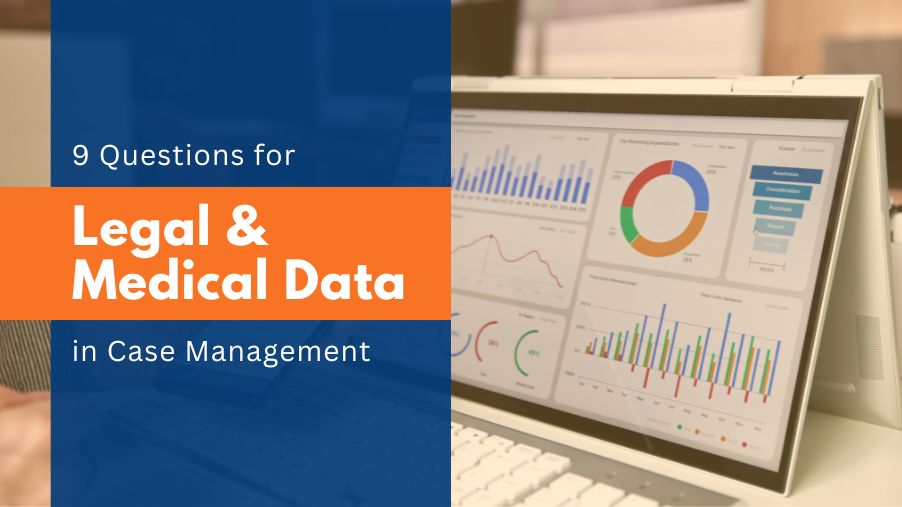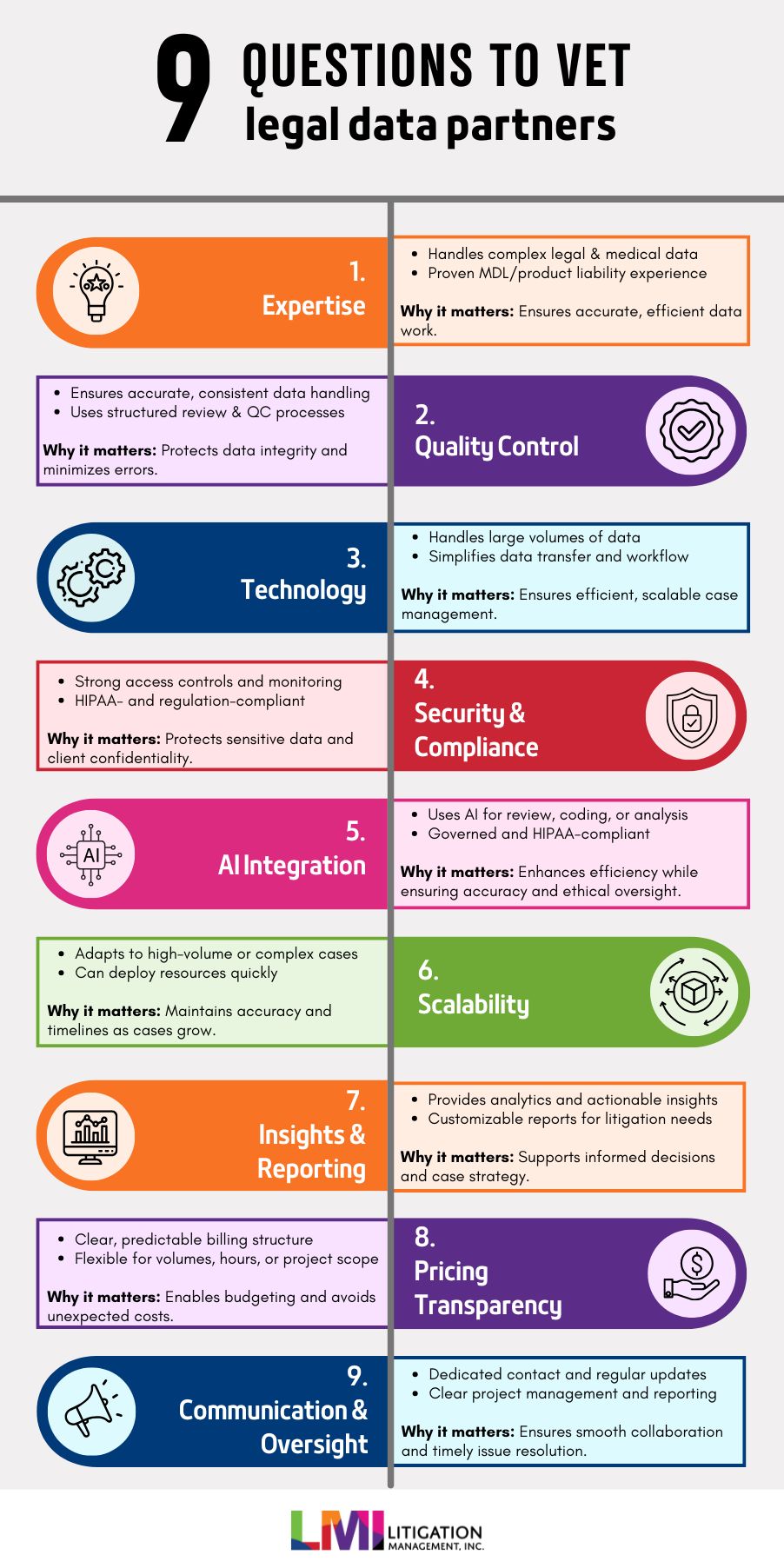
In complex litigation, legal teams manage vast volumes of medical and legal data. From medical records to discovery documents, handling this information in-house can be time-consuming, costly, and overwhelming.
Outsourcing legal and medical data management offers access to specialized expertise, secure technology, and scalable solutions, but selecting the right partner requires careful evaluation.
What is Legal and Medical Data Management in Case Management?
Legal and medical data management is a critical subset of case management. While case management focuses on overseeing the workflow of a legal matter—deadlines, filings, communications, and tasks—legal and medical data management ensures that the information driving those decisions is accurate, complete, and actionable.
Legal and Medical Data Management Services Include:
- Medical Record Retrieval & Management
Obtaining, indexing, and reviewing medical records for relevance and completeness.
- Medical Chronology & Case Analysis
Creating timelines and insights to support strategy and decision-making.
- Data Intake & Normalization
Structuring diverse data sources for consistent analysis.
- Document Coding & Data Management
Tagging and organizing key facts, entities, and relationships.
- Fact Sheet & Plaintiff Profile Management
Collecting and validating data across large plaintiff groups.
- Reporting & Analytics
Generating dashboards, metrics, and insights to support strategy and resolution.

9 Key Questions to Ask When Evaluating Case Management Partners for Legal and Medical Data
1. Expertise: What experience do you have with complex legal and medical data
- Have you managed large volumes of medical records and data sets?
- Do you have a proven track record in MDLs, product liability, or personal injury cases?
Understanding a partner’s experience ensures they are familiar with the types of cases and data complexity your matter requires. Expertise in both medical and legal contexts is critical for accuracy and efficiency.
2. Quality Control: How do you ensure accuracy and consistency in data handling?
- What processes verify the organization of records and documents?
- How often are quality control checks conducted throughout the project?
High-quality data management relies on structured processes and ongoing oversight. A reputable partner will have robust quality assurance procedures to minimize errors and maintain data integrity.
3. Technology: What platforms and tools do you use to manage data?
- Can your systems handle large-scale data efficiently?
- How do you simplify the process of transferring large volumes of records and case data to your system?
The right technology streamlines workflow, supports collaboration, and allows your team to analyze and leverage data effectively. Evaluating tools helps determine whether a partner can scale and adapt to complex case needs.
4. Security & Compliance: How do you protect sensitive information?
- What access controls and monitoring systems are in place?
- Are you HIPAA-compliant and aligned with federal and state privacy regulations?
Data protection is nonnegotiable. A qualified partner should maintain a strong, well-established security framework, including strict access controls, regulatory compliance, and incident response protocols to safeguard protected health information (PHI) and maintain client confidentiality at every stage of the project.
5. AI Integration: How does the provider leverage artificial intelligence in data management?
- Are AI tools used for document review, coding, summarization, or analysis?
- If AI tools are used, how do you ensure compliance with HIPAA and other privacy standards?
Artificial intelligence can significantly enhance efficiency and insight generation, but its value depends on how responsibly it’s applied. Ask how AI is governed, monitored, and validated to ensure output remains accurate, auditable, and ethically managed without replacing the human judgment essential in legal and medical review.
6. Scalability: Can the partner meet the demands of large or complex cases?
- How quickly can additional resources be put in place for high-volume matters?
- Do you have experience coordinating across multiple law firms or jurisdictions?
Cases can grow unexpectedly, and your partner must be able to scale with the workload without compromising accuracy or timelines. Scalability is a key factor in long-term partnerships.
7. Insights & Reporting: What analytics and reporting capabilities are offered?
- Can you provide actionable insights and trends?
- Are reports customizable to accommodate the changing needs of litigation?
Beyond organizing data, the right partner can help your team make informed decisions. Reporting and analytics capabilities are critical for case strategy and decision-making.
8. Pricing Transparency: How is pricing structured, and are costs predictable?
- Is billing based on volumes, hours, or project scope?
- Can costs be split between parties?
Clear pricing structures allow for budget planning and prevent surprises. Transparent, predictable costs are an important factor in evaluating any legal support partnership.
9. Communication & Oversight: How do you manage projects and keep clients informed?
- Will a dedicated contact manage and oversee the project?
- How frequently are updates provided, and in what format?
Effective communication ensures smooth collaboration, timely issue resolution, and overall confidence in your partnership. Regular updates and clear points of contact are essential.
Selecting a legal and medical data management partner is a strategic decision that impacts both case outcomes and operational efficiency. Evaluating expertise, technology, AI use, compliance, and communication practices helps ensure your partner can manage complex data securely and effectively. Asking the right questions upfront allows your legal team to stay focused on what matters most to build a stronger case.
Simplify Your Legal and Medical Data in Case Management
Handling complex medical and legal data doesn’t have to slow your case. Our team combines deep expertise, advanced technology, and strict compliance protocols to help legal teams:
- Manage and analyze large volumes of records efficiently
- Maintain accuracy and protect sensitive information
- Transform data into actionable insights for strategy and resolution
Ready to streamline your next case? Contact us today to discuss how we can support your legal data management needs.